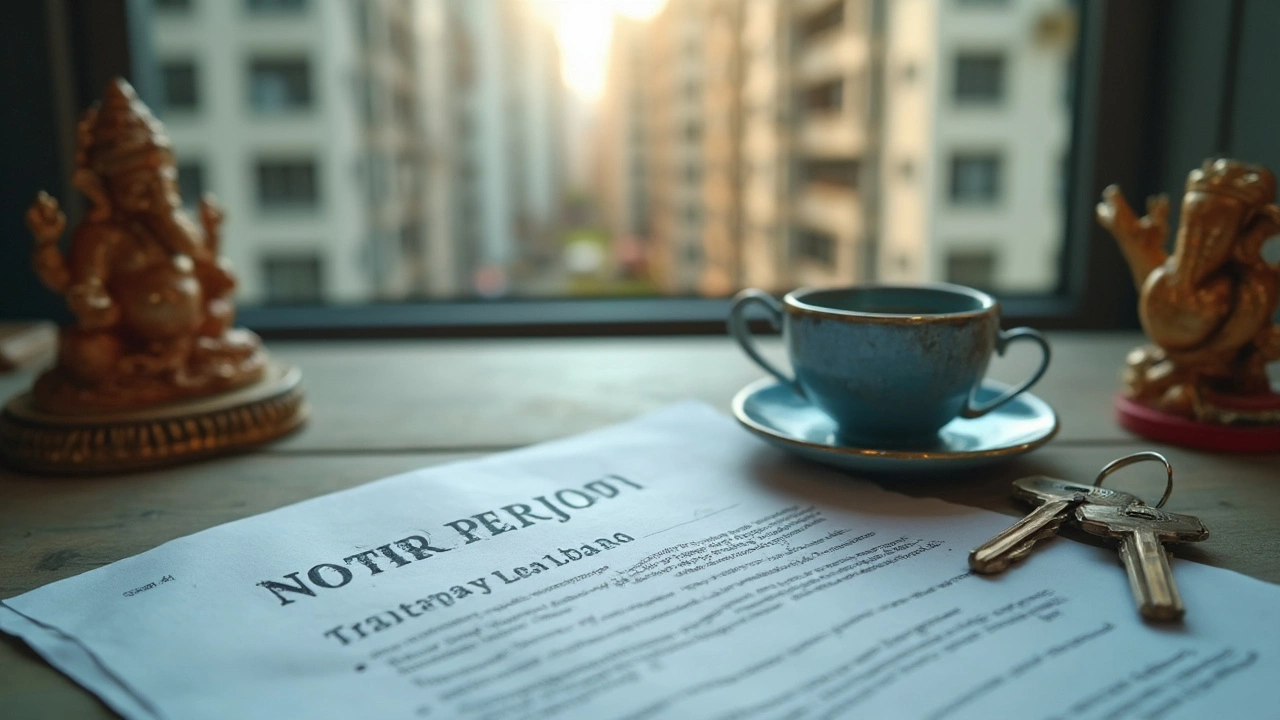Picture this: your rental agreement says it's up after April 30th, you haven't heard from your landlord, and you haven’t signed anything new. Now what? Turns out, plenty of renters just keep living in the same place, hoping for the best. But is that safe? Let’s clear up what really happens when your rental agreement isn’t renewed in India, because guessing games here can cost you a lot.
India’s rental scene isn’t exactly cut and dry. If there’s no renewed agreement, that doesn’t mean you lose all rights overnight. But, things get tricky. You slip from being a “tenant under contract” to what’s called a ‘tenant at sufferance’ or, in simple words, you’re living on borrowed time without a safety net. Landlords get itchy about this status, and your rights depend a lot on both the old agreement and how things play out next.
This isn’t just about paperwork—your ability to stay without hassle, get your deposit back, and avoid getting stuck with surprise eviction notices depends completely on what you do immediately after the agreement ends. And trust me, some landlords will test how much you really know about your rights.
- What happens when the lease expires
- Rights and risks for tenants
- What landlords can (and can’t) do
- Tips to avoid rental trouble
What happens when the lease expires
So, your rental agreement is over and you haven’t signed a new one. First thing—you're not a trespasser, but you also don’t have the cover you did. Usually, one of three things happens: you keep living there quietly, your landlord asks you to leave, or you both agree to new terms.
In India, most agreements run for 11 months, basically to dodge extra stamp duty and tricky rules under the Rent Control Act. Once your lease ends, if no one kicks up a fuss, you sort of slide into a “month-to-month” scene. That means you pay rent each month, but you don’t have a fresh contract. Legally, this is called "holding over." The key thing? Both sides need to be okay with it, even if it’s just silent acceptance (like accepting rent through a bank transfer).
But here’s what could actually pop up when the lease lapses:
- Landlord accepts rent without a new agreement: This usually means the lease shifts automatically to a monthly basis. Neither side needs a new document, but the old terms stick—except the end date. Both sides can walk away with about a month’s notice.
- Landlord refuses rent and issues a notice: This means they want you out. Legally, they need to give written notice. The period is usually the same as your old contract’s notice period—often one month, but always check your earlier deal.
- Both sides renegotiate: Maybe you talk rent increase or other changes right away. If you sign a new agreement, you’re back to full protection as a regular tenant under contract.
Here's a quick summary of what typically happens in bigger cities:
| City | Normal Lease Length | Notice Period |
|---|---|---|
| Mumbai | 11 months | 1 month |
| Bangalore | 11 months | 1 month |
| Delhi | 11 months | 1 month |
If you don’t have anything new in writing, don’t just assume you’re protected. Things can go south fast, especially if the landlord suddenly changes their mind.
Rights and risks for tenants
So your rental agreement isn’t renewed. A lot of tenants freak out, but you don’t lose all your rights instantly. If you just stay on after the agreement expires, the law recognizes you as a “tenant at sufferance.” You still have some standing, but it’s a weaker spot compared to having a live contract in hand.
Here’s the big one you need to know: the landlord can’t just show up and throw your stuff out on May 1st if your lease expired on April 30th. Indian law usually says landlords have to give a notice—often at least one month—before tossing you out. This is true for almost every city, from Mumbai to Bangalore, thanks to the Model Tenancy Act and local rent laws.
But this is where it gets real: without a renewed agreement, you lose the right to demand many protections. For example, your rent amount can be questioned, chances of a rent hike go up, and your deposit can get messy if you move out in a rush.
- If you refuse to leave after notice, the landlord can go to court. That means legal stress and extra costs for you.
- Without paperwork, it’s tough to claim your deposit back, or argue about what was damaged. Landlords sometimes use the lack of a contract to keep your security deposit.
- No clear renewal means the landlord can also pressure you for a fresh, higher rent or new terms.
Here’s a quick snapshot of what usually happens if the rental agreement isn’t renewed:
| Situation | Impact on Tenant |
|---|---|
| No agreement, but rent is accepted | Tenancy is considered month-to-month, but weak legal footing |
| Landlord gives written notice | Tenant usually gets about one month to vacate |
| Deposit return | Disputes likely, harder to get back without clear terms |
| Eviction threat | Legally possible, but with due process (court order needed) |
One out of three renters in big Indian cities face some tension with landlords after the lease expires, especially if there’s no paperwork. You don’t want to be part of that stat, so always keep records of rent paid (even screenshots of bank transfers). And if you’re worried your landlord is pushing the limits, talk to a local lawyer or tenant rights group. It’s way cheaper than fighting an ugly eviction case later.

What landlords can (and can’t) do
If your rental agreement isn’t renewed in India, a lot of tenants get nervous about what rights their landlord actually has. So let’s break it down with clear facts, not rumors.
First up—your landlord can’t just show up and kick you out the next day. Even if your agreement has expired, Indian law protects tenants from random lockouts or changed locks. There’s a proper process, and skipping it is illegal.
Here’s what landlords can do legally:
- Serve you a written notice (usually one month, but always check your expired lease or local state laws—sometimes it’s two to three months depending on your city, like Mumbai or Bengaluru).
- File for eviction through the court if you don’t leave after the notice period. No agreement means you’re on a month-to-month arrangement, and the landlord has the right to reclaim their property—but only through the official route.
- Hold back your security deposit only for unpaid rent or actual property damage (not just for overstaying unless the agreement allows for extra charges).
But here are things your landlord can’t legally do:
- Force entry or physically remove your things.
- Disconnect your electricity or water.
- Intimidate or harass you to move out.
- Keep your belongings as ‘hostage’ for rent or damages.
Don’t let a landlord scare you with threats that aren’t legally valid. If things get ugly, you can go to the police or file a complaint at your local Rent Control Office.
Here’s a quick comparison of what’s allowed and what’s not:
| Action | Landlord Allowed? |
|---|---|
| Serving written notice | Yes |
| Eviction through court | Yes |
| Changing locks overnight | No |
| Physically removing tenant | No |
| Keeping security deposit unfairly | No |
| Withholding deposit for damages/unpaid rent | Yes |
If you’re not sure about your rights as a tenant, call a local lawyer. Don’t just walk away because your agreement ended—a lot of Indians stay for months after expiry, and courts usually expect landlords to follow procedure, not bulldoze through it.
Tips to Avoid Rental Trouble
It’s way simpler to dodge problems with your rental agreement than to fix them later. You just have to be proactive and a bit organized. Here’s what works in the real world, especially in India’s unpredictable renting scene.
- Keep Written Records: Every chat with your landlord about your rental agreement—even if it’s on WhatsApp or email—save it. If you discuss renewal, send a follow-up text or message. A lot of tenants get caught out when there’s no paper trail.
- Send a Notice Early: Don’t wait for your landlord to bring up renewal. If you want to stay, message or mail your landlord about renewing the rental agreement at least 30 days before it expires. This is also your chance to ask for new terms if you want them.
- Review Old Agreement Terms: Many agreements say the tenant must leave if the lease isn’t renewed, but others switch you to a month-to-month deal automatically. Double-check yours so you’re not blindsided.
- Be Clear on Deposit Rules: In India, the security deposit can be up to 10 months’ rent in big cities. Confirm how much notice you need to give to get your full deposit back—and don’t leave before sorting this out in writing.
- Don’t Ignore Eviction Steps: Landlords can’t just show up and tell you to leave. They must give written notice—usually 15-30 days, depending on your agreement, or follow what the local Rent Control Act says in your city.
| City | Standard Notice Period | Usual Deposit (months) |
|---|---|---|
| Bangalore | 30 days | 10 |
| Mumbai | 30 days | 6 |
| Delhi | 30 days | 2-3 |
One more tip—never hand over keys before sorting final bills and getting a written note from your landlord saying you’ve handed the place back. A lot of tenant rights India disputes happen because someone left in a rush. Don’t let that be you.


